The following announcement was written by TheGenealogist:
TheGenealogist has just released the records for another 98,618 individuals from Southwark to increase the number of records to over 800,000 individuals in its unique online Lloyd George Domesday Survey. These property records are a fantastic resource for researchers searching for where an ancestor lived in the period 1910-1915.
The Lloyd George Domesday Survey is a massive project being carried out by TheGenealogist to digitise a combination of large scale Ordnance Survey maps and residential data field books from The National Archives. Using the records from the former Valuation Office Survey (known as the Lloyd George Domesday Survey) enables family history researchers to precisely pinpoint where an ancestor’s house had been on exceptionally detailed hand annotated maps from the period. These have been made even more useful to researchers as they have been georeferenced and are displayed as a layer in TheGenealogist’s powerful Map Explorer™.
 Nelson Dockyard Rotherhithe from Lloyd George Domesday Survey maps
Nelson Dockyard Rotherhithe from Lloyd George Domesday Survey maps
Family historians can often have problems when looking for where their ancestors lived. Even when they have located an ancestor’s address in the census, over time road names may have changed and many streets have been renumbered or bombed out of existence in the Blitz. With redevelopment the area can change substantially, adopting new layouts that make searching for where an ancestor lived using modern maps a frustrating experience.
With the Lloyd George Domesday Survey records on TheGenealogist, however, researchers will be able to:
- link individual properties to pins on extremely detailed ordnance survey maps from the 1910s
- read information often giving a detailed description of the property in original Field Books
- locate a specific house on the map from an address found in a census or street directory
- search the records by surname, parish and street.
- zoom down to show plots of the individual properties as they existed in 1910-1915
- reveal modern map layers georeferenced to the survey maps to show the modern topography
The linked Field Books will also provide researchers with information regarding the valuation of each property, including the valuation assessment number, map reference, owner, occupier, situation, description and extent.
This mammoth project is ongoing with over 94,500 Field Books, each having hundreds of pages to digitise with associated large scale IR121 annotated OS maps. This release from TheGenealogist takes the total released so far to over 800,000 individuals and is available to their Diamond subscribers.
This new release of records include properties situated in the following Southwark parishes: Bermondsey Central, Bermondsey East, Bermondsey South, Bermondsey West, Camberwell, Camden, Christchurch, Dulwich, Dulwich East, Peckham North, Peckham South & Nunhead, Rotherhithe, Rye Lane & St Georges, Saint Peter, St George the Martyr East, St George the Martyr North, St George the Martyr South, St Georges East, St John by Horsleydown, St Mary & St Paul, St Olave & St Thomas, St Saviour 1, St Saviour 2, and Trinity.
Read TheGenealogist’s article about how the Lloyd George Domesday Survey Property records from the 1910s show us the Southwark home of Michael Caine’s family https://www.thegenealogist.co.uk/featuredarticles/2021/property-records-from-the-1910s-show-us-the-southwark-of-michael-caines-family-1376/
To find out more about these records, you can visit their informative record collection page at TheGenealogist.co.uk/1910Survey/
About TheGenealogist
TheGenealogist is an award-winning online family history website, who put a wealth of information at the fingertips of family historians. Their approach is to bring hard to use physical records to life online with easy to use interfaces such as their Tithe and newly released Lloyd George Domesday collections.
TheGenealogist’s innovative SmartSearch technology links records together to help you find your ancestors more easily. TheGenealogist is one of the leading providers of online family history records. Along with the standard Birth, Marriage, Death and Census records, they also have significant collections of Parish and Nonconformist records, PCC Will Records, Irish Records, Military records, Occupations, Newspaper record collections amongst many others.
TheGenealogist uses the latest technology to help you bring your family history to life. Use TheGenealogist to find your ancestors today!
 Latest News Articles
Latest News Articles If you do not see a Plus Sign that is labeled "Add comment," you will need to upgrade to either a (FREE) Standard Edition or a (paid) Plus Edition subscription
If you do not see a Plus Sign that is labeled "Add comment," you will need to upgrade to either a (FREE) Standard Edition or a (paid) Plus Edition subscription  Do you have an RSS newsreader? You may prefer to use this newsletter's RSS feed at:
Do you have an RSS newsreader? You may prefer to use this newsletter's RSS feed at: